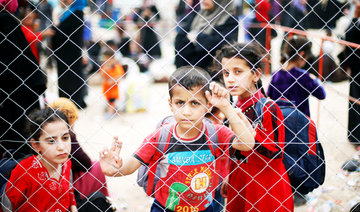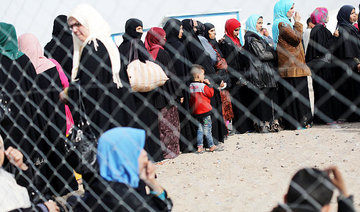JEDDAH: Turkish President Recep Tayyip Erdogan has described the Iraqi paramilitary organization Al-Hashd Al-Shaabi as a “terrorist” entity.
In an interview with the Al-Jazeera television channel, Erdogan referred to the group and said: “In the fight against Daesh in Iraq there is something striking. It’s interesting, the Iraqi Parliament says Al-Hashd Al-Shaabi is not a terror group but what is interesting is who is behind this terror group.”
The statement drew an angry response from Baghdad, with the Iraqi Foreign Ministry summoning the Turkish ambassador over the issue.
“The Foreign Ministry has decided to summon the Turkish ambassador in Baghdad to hand him a formal protest note regarding recent remarks by the Turkish president on Al-Hashd Al-Shaabi,” Ahmad Jamal, the ministry’s spokesman, was quoted as saying by AFP.
The Turkish ambassador in Baghdad, Fatih Yildiz, began his diplomatic duty in January.
Al-Hashd Al-Shaabi is an umbrella of armed groups dominated by Shiite militia loyal to Iran.
Erdogan is a reviled figure among many of Iraq’s Shiite parties, who accuse him of having directly supported the emergence of Daesh and of continuing to abet the extremists’ operations.
Political analyst and former US diplomat Ali Khedery told Arab News that he was not surprised by Erdogan’s description of Al-Hashd Al-Shaabi as a terrorist organization.
“Going back to the 1980s, Iran did in fact create these Iraqi Shiite militias,” Khedery said. “It has since continued to train, arm, finance and, in many cases, direct them in Iraq, Syria, Lebanon and now Yemen, and potentially the Gulf countries as well. Turkey’s and the Gulf states’ positions on these Iranian-commanded and controlled militias — whether they are under the guise of the so-called Al-Hashd Al-Shaabi, which has been brought under the control of a government umbrella — is that they are terrorist organizations.”
As to why Iran has promoted these kinds of militias, Khedery said: “I believe that it is Iran’s strategic plan, or Tehran’s strategic plan, to reconstitute the ancient Persian empire, which stretched from the Mediterranean all the way to the Indian Ocean through Afghanistan and Pakistan. That means Iran has Arabs, Afghans and Pakistanis dying en masse to advance Persian interests under the guise of Shiite unity. I don’t honestly think that the mullahs in Tehran give a damn about the global Shiite population. They only care about Persia.”
Khedery said the global community should join in the efforts to counter such militias.
“Turkey and the Gulf countries can — and they should — counter them. But I believe that the entire world should come together to counter them because Iran’s regional hegemonic ambitions are a threat to global security and stability,” he said.
“This is a global problem. One of the many reasons Daesh exists is because of unjust rule by Baghdad and Damascus. That rule caused the disenfranchisement of millions of Sunni Arabs, which turned into an insurgency and has been taken advantage of by jihadi groups.”
On why the West is obsessed with the threat posed by Daesh more than that of the Shiite militias, Khedery said: “I share that concern and I share that frustration but I don’t have an answer.”
He added: “I think it is principally because while Shiite radicals pioneered the concept of suicide bombers, namely in Lebanon against the US Embassy and the marine barracks, Americans have a really short memory... The view among the majority is that yes, the Shiite militias and Iranian Revolutionary Guards are a problem but they didn’t blow up the World Trade Center. So we will deal with them later but, in the meantime, the immediate threat is Daesh, Al-Qaeda and other radical Sunni groups.”
Erdogan calls Al-Hashd Al-Shaabi a ‘terror’ organization
Erdogan calls Al-Hashd Al-Shaabi a ‘terror’ organization

Russia says Israel attacks on Iran are illegal, notes Iran’s commitement to NPT

- The statement said Moscow was waiting for the International Atomic Energy Agency to provide “unvarnished” assessments of the damage caused to Iranian nuclear facilities by Israeli attacks
MOSCOW: Russia’s Foreign Ministry on Tuesday denounced continued Israeli attacks on Iran as illegal and said a solution to the conflict over Tehran’s nuclear program could only be found through diplomacy.
A ministry statement posted on Telegram noted Iran’s “clear statements” on its commitment to adhere to the nuclear non-proliferation treaty and its willingness to meet with US representatives.
The statement also said Moscow was waiting for the International Atomic Energy Agency to provide “unvarnished” assessments of the damage caused to Iranian nuclear facilities by Israeli attacks.
Qatari emir and Turkish president discuss Israeli attacks on Iran

- Sheikh Tamim bin Hamad Al-Thani and Recep Tayyip Erdogan emphasize important need to deescalate conflict and find diplomatic solutions
LONDON: Sheikh Tamim bin Hamad Al-Thani, the Emir of Qatar, and Turkish President Recep Tayyip Erdogan on Tuesday discussed Israel’s ongoing attacks on Iran, which began on Friday and have targeted nuclear sites, military leaders, intelligence chiefs and atomic scientists.
During their call, the leaders emphasized the important need to deescalate the conflict and find diplomatic solutions, the Qatar News Agency reported.
Earlier in the day, the Qatari minister of state for foreign affairs, Mohammed Al-Khulaifi, warned during a call with Rafael Grossi, the director general of the International Atomic Energy Agency, that the targeting of Iranian nuclear facilities by Israel represented a serious threat to regional and international security.
The IAEA reported on Monday that an Israeli airstrike on Iran’s Natanz Nuclear Facility on Friday had damaged centrifuges at the underground uranium-enrichment plant, raising concerns about possible radiological and chemical contamination in the area.
Qatari minister of state, IAEA chief discuss ‘serious threat’ of Israeli strikes on Iran’s nuclear sites

- Mohammed bin Abdulaziz Al-Khulaifi reiterates Qatar’s condemnation of attacks on Iranian territory
- He said targeting nuclear facilities threatens regional, international security
LONDON: The Qatari Minister of State for Foreign Affairs Mohammed bin Abdulaziz Al-Khulaifi on Tuesday discussed the conflict between Israel and Iran with Rafael Grossi, the director general of the International Atomic Energy Agency.
Al-Khulaifi discussed in a call the Israeli attacks on Iranian nuclear facilities that began on Friday, targeting the Natanz, Fordo, and Isfahan nuclear sites.
Al-Khulaifi stressed that targeting nuclear facilities was a serious threat to regional and international security. He reaffirmed Qatar’s commitment to dialogue to resolve conflicts and achieve peace in the region.
The officials discussed ways to improve the security of nuclear facilities and ensure they are safeguarded against threats, the Qatar News Agency reported.
Al-Khulaifi reiterated Qatar’s strong condemnation of the Israeli attacks on Iranian territory, deeming them blatant violations of Iran’s sovereignty and security, the QNA added.
The IAEA reported on Monday that the Israeli airstrike on Iran’s Natanz facility on Friday damaged the centrifuges of the underground uranium enrichment plant, raising concerns about potential radiological and chemical contamination in the area.
US pulls out of two more bases in Syria, worrying Kurdish forces

- The SDF did not respond to questions about the current number of troops and open US bases in northeastern Syria
AL-SHADADI BASE: US forces have pulled out of two more bases in northeastern Syria, visiting reporters found, accelerating a troop drawdown that the commander of US-backed Syrian Kurdish forces said was allowing a resurgence of Daesh.
The reporters who visited the two bases in the past week found them mostly deserted, both guarded by small contingents of the Syrian Democratic Forces — the Kurdish-led military group that Washington has backed in the fight against Daesh for a decade.
Cameras used on bases occupied by the US-led military coalition had been taken down, and razor wire on the outer perimeters had begun to sag.
A Kurdish politician who lives on one base said there were no longer US troops there. SDF guards at the second base said troops had left recently but refused to say when.
HIGHLIGHTS
• No US troops present at Al-Wazir and Tel Baydar bases.
• Daesh threat ‘has significantly increased’, SDF commander says.
The Pentagon refused to comment.
It is the first confirmation on the ground by reporters that the US has withdrawn from Al-Wazir and Tel Baydar bases in Hasaka province.
It brings to at least four the number of bases in Syria US troops have left since President Donald Trump took office.
Trump’s administration said this month it will scale down its military presence in Syria to one base from eight in parts of northeastern Syria that the SDF controls.
The New York Times reported in April that troops might be reduced from 2,000 to 500 in the drawdown.
The SDF did not respond to questions about the current number of troops and open US bases in northeastern Syria.
But SDF commander Mazloum Abdi, who spoke at another US base, Al-Shadadi, said the presence of a few hundred troops on one base would be “not enough” to contain the threat of Daesh.
“The threat of Daesh has significantly increased recently. But this is the US military’s plan. We’ve known about it for a long time ... and we’re working with them to make sure there are no gaps and we can maintain pressure on Daesh State,” he said.
Abdi spoke on Friday, hours after Israel launched its air war on Iran. He refused to comment on how the new Israel-Iran war would affect Syria, saying simply that he hoped it would not spill over there and that he felt safe on a US base.
Hours after the interview, three Iranian-made missiles targeted the Al-Shadadi base and were shot down by US defense systems, two SDF security sources said.
Daesh ruled vast swathes of Iraq and Syria from 2014 to 2017 during Syria’s civil war.




















